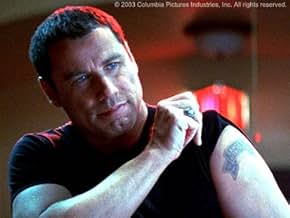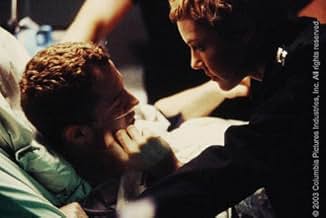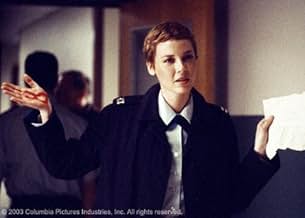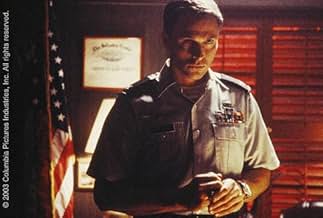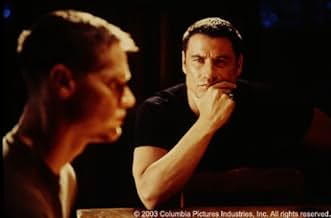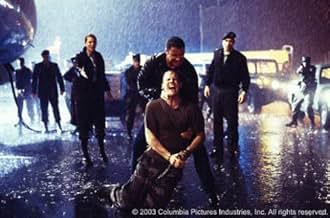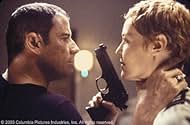Basic
NOTE IMDb
6,4/10
68 k
MA NOTE
Un agent de la D. E. A. Enquête sur la disparition d'un légendaire sergent instructeur des Rangers de l'armée et de plusieurs de ses cadets au cours d'un exercice d'entraînement qui a mal to... Tout lireUn agent de la D. E. A. Enquête sur la disparition d'un légendaire sergent instructeur des Rangers de l'armée et de plusieurs de ses cadets au cours d'un exercice d'entraînement qui a mal tourné.Un agent de la D. E. A. Enquête sur la disparition d'un légendaire sergent instructeur des Rangers de l'armée et de plusieurs de ses cadets au cours d'un exercice d'entraînement qui a mal tourné.
- Récompenses
- 3 nominations au total
Histoire
Le saviez-vous
- AnecdotesScreenwriter James Vanderbilt wanted to fool a certain type of moviegoer. He said: " . . . those who say 'I know who the killer is' in the first ten minutes."
- GaffesDuring the first platoon inspection scene, Sergeant West is wearing Specialist rank on his uniform collar, four ranks lower than the Master Sergeant ranks he is wearing on the epaulets of his sweater.
- ConnexionsFeatured in Basic Ingredients: A Writer's Perspective (2003)
- Bandes originalesBolero
Written by Maurice Ravel
Performed by Hungarian State Orchestra
Conducted by Ádám Fischer
Courtesy of LaserLight Digital
By Arrangement with Source/Q
Commentaire à la une
"Basic" takes a lot of plot twists through the steamy jungles of Panama. They are often impossible to follow. No, literally. Impossible. As in they literally do not piece together. You can try to analyze them, but when you do, you find out there is nothing really to be analyzed. But the film, by confusing and tricking the audience, makes it appear as if something is there, which is almost as good as if something really is there. Therefore, the movie, though frustratingly difficult to follow at times, is entertaining. Confused yet? Yeah, that's what the movie will make you feel like.
The film opens up in a rain-drenched Panama jungle at night on an Army training mission headed by Sergeant West (Samuel L. Jackson). Most of the film--ALL of the film, for that matter--takes place at night, during a rainy hurricane, and adds to the nonexistant plot. What is so intriguing is that the plot isn't really there, but the writer tries to manifest one, and we feel as if we are staring at some nonexistant, material wad of words and flashbacks and images thrown together in a blender, the writer hoping for it to come out smelling of roses. But I already went over that, didn't I?
Flash forward to the next day. An Army chopper picks up two men from the training mission, one injured and one very much alive. The injured man, Kendall (Giovanni Ribisi), is sent to a hospital, and the alive man, Dunbar (Brian Van Holt) is sent in for questioning by the very sexy and very Southern Osborne (Connie Nielsen). Dunbar refuses to speak to anyone except a Ranger. So in comes Ranger Tom Hardy (John Travolta) to piece together the events surrounding the death of Sgt. West and his team.
The writer of "Basic," James Vanderbilt, has so many twists and turns that the film is impossible to keep up with. I like movies like these, where you see different characters telling their version of one event, but the mistake Vanderbilt makes is that he overuses the plot flashbacks in the middle of other events. It becomes hard to seperate present from past and what's real from what's not. So many revelations happen that I feel like I'm in the middle of the writer's mind, as he comes up with new ideas and tries to squeeze them in time after time after time. There is a limit to how many times you can use "surprise" revelation endings. Vanderbilt uses three of four in a row, piled on top of each other, time after time after time. Just as we think the plot twists are done, and we start to smile because we think we might finally understand the basis of the plot, something else happens, and we zoom in suspensefully on John Travolta's face as he, along with the audience, realizes something. Which leads me to something else.
The end of the film leaves more open than concluded. So many plot holes are never ironed out. With the ending being the way it is, you can look back at certain events and think, "Why did that surprise (so-and-so)," and "Why did that event happen as it pays no relevancy to the plot?" The answer to all this? Simple: It's called audience manipulation, and James Vanderbilt uses it a lot. He throws the audience a bone to keep them happy, continues with something else, throws another bone, and when it's all done and over, we're choking on all these bones and he doesn't realize it. Interesting how he said he named his character Tom Hardy after the Hardy Boys. If I recall, the Hardy Boy novels, which I was an avid reader of at one time, usually revealed a lot at the end. "Basic" tries to, but does not.
The film has an excellent director at its helm, John McTiernan. A man who chooses his projects carefully and wisely and, unfortunately, sometimes horribly ("Rollerball" was exceptionally bad). But "Die Hard" and "Predator" are two of my all-time favorite action films, "Predator" being my all-time favorite "alien" movie. Who wants McTiernan to return to his roots and film a "Predator 3"? It would be good, but don't count on it. Like I said, he chooses wisely, and if I assume correctly, he's the kind of director who doesn't like to return to old projects.
"Basic" confused me, but after the film was over and my mind was in a knot trying to figure out all the different plot twists, I realized how much fun I had being duped by this film. I laughed to myself as I came to realize that this movie has a paper-thin plot, and the filmmakers all tricked us by taking so many twists and turns and throwing so many confusion bones at the audience and making us believe that the underlying plot of the film was something deep. I really enjoyed this movie, even if I still don't really understand it fully. Then again, I don't think you're really supposed to.
3.5/5 stars -
The film opens up in a rain-drenched Panama jungle at night on an Army training mission headed by Sergeant West (Samuel L. Jackson). Most of the film--ALL of the film, for that matter--takes place at night, during a rainy hurricane, and adds to the nonexistant plot. What is so intriguing is that the plot isn't really there, but the writer tries to manifest one, and we feel as if we are staring at some nonexistant, material wad of words and flashbacks and images thrown together in a blender, the writer hoping for it to come out smelling of roses. But I already went over that, didn't I?
Flash forward to the next day. An Army chopper picks up two men from the training mission, one injured and one very much alive. The injured man, Kendall (Giovanni Ribisi), is sent to a hospital, and the alive man, Dunbar (Brian Van Holt) is sent in for questioning by the very sexy and very Southern Osborne (Connie Nielsen). Dunbar refuses to speak to anyone except a Ranger. So in comes Ranger Tom Hardy (John Travolta) to piece together the events surrounding the death of Sgt. West and his team.
The writer of "Basic," James Vanderbilt, has so many twists and turns that the film is impossible to keep up with. I like movies like these, where you see different characters telling their version of one event, but the mistake Vanderbilt makes is that he overuses the plot flashbacks in the middle of other events. It becomes hard to seperate present from past and what's real from what's not. So many revelations happen that I feel like I'm in the middle of the writer's mind, as he comes up with new ideas and tries to squeeze them in time after time after time. There is a limit to how many times you can use "surprise" revelation endings. Vanderbilt uses three of four in a row, piled on top of each other, time after time after time. Just as we think the plot twists are done, and we start to smile because we think we might finally understand the basis of the plot, something else happens, and we zoom in suspensefully on John Travolta's face as he, along with the audience, realizes something. Which leads me to something else.
The end of the film leaves more open than concluded. So many plot holes are never ironed out. With the ending being the way it is, you can look back at certain events and think, "Why did that surprise (so-and-so)," and "Why did that event happen as it pays no relevancy to the plot?" The answer to all this? Simple: It's called audience manipulation, and James Vanderbilt uses it a lot. He throws the audience a bone to keep them happy, continues with something else, throws another bone, and when it's all done and over, we're choking on all these bones and he doesn't realize it. Interesting how he said he named his character Tom Hardy after the Hardy Boys. If I recall, the Hardy Boy novels, which I was an avid reader of at one time, usually revealed a lot at the end. "Basic" tries to, but does not.
The film has an excellent director at its helm, John McTiernan. A man who chooses his projects carefully and wisely and, unfortunately, sometimes horribly ("Rollerball" was exceptionally bad). But "Die Hard" and "Predator" are two of my all-time favorite action films, "Predator" being my all-time favorite "alien" movie. Who wants McTiernan to return to his roots and film a "Predator 3"? It would be good, but don't count on it. Like I said, he chooses wisely, and if I assume correctly, he's the kind of director who doesn't like to return to old projects.
"Basic" confused me, but after the film was over and my mind was in a knot trying to figure out all the different plot twists, I realized how much fun I had being duped by this film. I laughed to myself as I came to realize that this movie has a paper-thin plot, and the filmmakers all tricked us by taking so many twists and turns and throwing so many confusion bones at the audience and making us believe that the underlying plot of the film was something deep. I really enjoyed this movie, even if I still don't really understand it fully. Then again, I don't think you're really supposed to.
3.5/5 stars -
- MovieAddict2016
- 15 juil. 2003
- Permalien
Meilleurs choix
Connectez-vous pour évaluer et suivre la liste de favoris afin de recevoir des recommandations personnalisées
Everything New on Prime Video in January
Everything New on Prime Video in January
Your guide to all the new movies and shows streaming on Prime Video in the US this month.
- How long is Basic?Alimenté par Alexa
Détails
Box-office
- Budget
- 50 000 000 $US (estimé)
- Montant brut aux États-Unis et au Canada
- 26 793 311 $US
- Week-end de sortie aux États-Unis et au Canada
- 11 511 960 $US
- 30 mars 2003
- Montant brut mondial
- 42 792 561 $US
- Durée1 heure 38 minutes
- Couleur
- Mixage
- Rapport de forme
- 2.39 : 1
Contribuer à cette page
Suggérer une modification ou ajouter du contenu manquant







